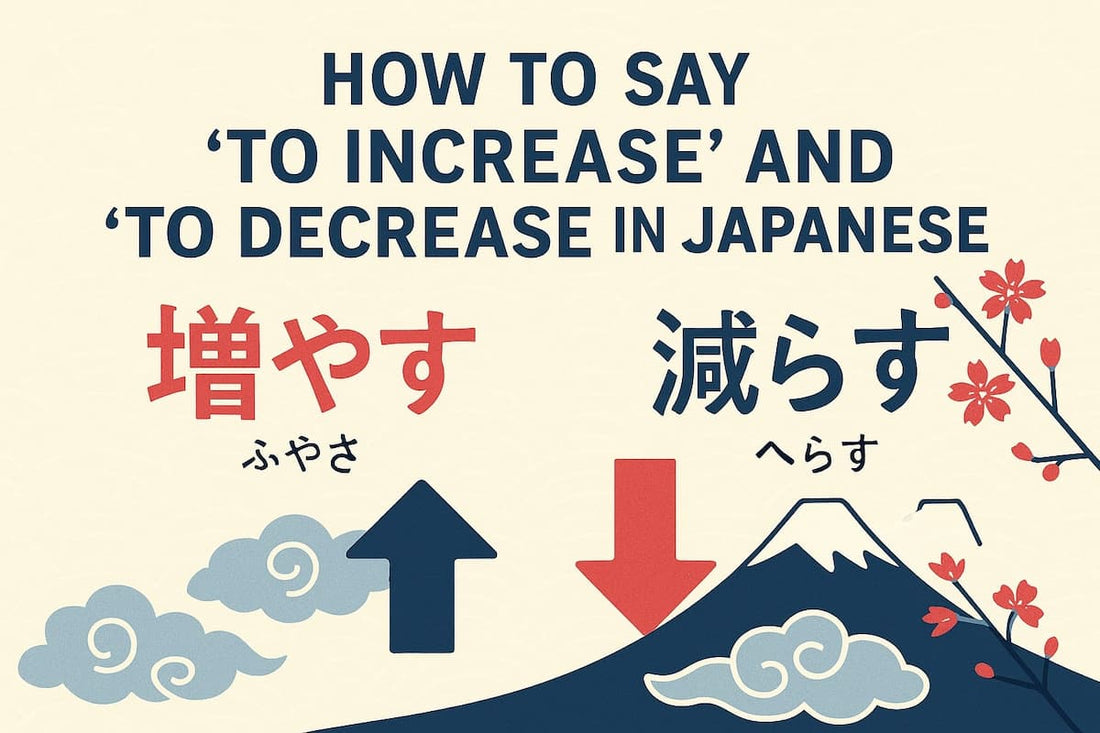
How to Say “To Increase” and “To Decrease” in Japanese: With Examples
Share
You've noticed there are multiple ways to say “to increase” or "to decrease" in Japanese. Between transitive and intransitive verbs, and the difference in nuances, it's easy to confuse them.
Here’s a breakdown of the main ways to say “to increase” and “to decrease” in Japanese, with nuance, usage, and examples.
A. "To increase" in Japanese
✅ 1. 増える(ふえる) – to increase (intransitive)
Meaning: Something increases on its own
- Common, neutral, natural growth or rise
- Use when the subject increases by itself, no one causes it
Examples:
- 人口が増えている。→ The population is increasing.
- 仕事が増えた。→ My work increased.
✅ 2. 増やす(ふやす) – to increase (transitive)
Meaning: You cause something to increase
- You or someone actively adds or increases something
Examples:
- 単語の数を増やしたい。→ I want to increase my vocabulary.
- 商品を増やしました。→ We increased the number of products.
✅ 3. 上がる(あがる) – to go up (intransitive)
Meaning: Something rises (like prices, temperature, level, etc.)
- More contextual or technical than 増える
- Often used with numbers, stats, prices
Examples:
- 気温が上がった。→ The temperature went up.
- 成績が上がった。→ My grades improved.
✅ 4. 上げる(あげる) – to raise (transitive)
Meaning: You raise or increase something
- Use when someone causes something to rise or go up
Examples:
- 給料を上げてほしい。→ I want my salary raised.
- 値段を上げました。→ We raised the price.
✅ 5. 伸びる(のびる) – to grow/extend/increase (intransitive)
Meaning: Progress or improvement in something
- Often used for skills, height, sales, performance, reach
Examples:
- 成績が伸びてきた。→ My grades have improved.
- フォロワーが伸びている。→ My followers are increasing.
✅ 6. 上昇する(じょうしょうする) – to rise (formal)
Meaning: Used in news, economics, technical writing
- Like "rise" in English (e.g., “prices rose sharply”)
Examples:
- 物価が上昇しています。→ Prices are rising.
- 失業率が上昇した。→ The unemployment rate increased.
✅ 7. 増大する(ぞうだいする) – to increase in size/magnitude (formal)
Meaning: Abstract or large-scale increase
- Often used with pressure, demand, risk, tension, fear, etc.
Examples:
- ストレスが増大している。→ Stress is increasing.
- リスクが増大した。→ The risk increased.
✅ Summary Chart
| Expression | Transitive? | Context / Nuance | Example |
|---|---|---|---|
| 増える | No | Natural increase | 人が増えた |
| 増やす | Yes | You cause the increase | 人を増やす |
| 上がる | No | Prices, levels, scores | 気温が上がる |
| 上げる | Yes | You raise price/level | 値段を上げる |
| 伸びる | No | Growth, progress, development | 成績が伸びた |
| 上昇する | No | Formal, stats, economics | 物価が上昇 |
| 増大する | No | Formal, abstract quantity | プレッシャーが増大 |
B. "To decrease" in Japanese
✅ 1. 減る(へる) – to decrease (intransitive)
Meaning: Something decreases on its own
- Very common and neutral
- Natural drop in number, quantity, weight, etc.
Examples:
- 人口が減っている。→ The population is decreasing.
- 食べる量が減った。→ I’m eating less.
✅ 2. 減らす(へらす) – to decrease (transitive)
Meaning: You intentionally reduce something
- Opposite of 増やす
Examples:
- 体重を減らしたい。→ I want to lose weight.
- 出費を減らすべきだ。→ We should reduce expenses.
✅ 3. 下がる(さがる) – to go down (intransitive)
Meaning: Numbers or levels go down
- Often used with prices, temperature, ratings, etc.
- Slightly more technical/formal than 減る
Examples:
- 気温が下がった。→ The temperature dropped.
- 成績が下がった。→ My grades went down.
✅ 4. 下げる(さげる) – to lower (transitive)
Meaning: You actively lower something
- Opposite of 上げる
Examples:
- 音量を下げてください。→ Please lower the volume.
- 税金を下げるべきだ。→ Taxes should be lowered.
✅ 5. 縮小する(しゅくしょうする) – to shrink / reduce in size
Meaning: Formal or business/technical use
- Used for operations, scale, organization, activity
Examples:
- 事業を縮小した。→ We downsized the business.
- サービスの規模を縮小する。→ Reduce the scale of the service.
✅ 6. 低下する(ていかする) – to decline / fall (formal)
Meaning: Used for value, performance, level
- Often used with quality, motivation, ability, etc.
Examples:
- 集中力が低下している。→ My concentration is dropping.
- サービスの質が低下した。→ Service quality declined.
✅ 7. 減少する(げんしょうする) – to decrease (formal)
Meaning: Formal version of 減る
- Used in news, reports, research, etc.
Examples:
- 観光客の数が減少している。→ Tourist numbers are decreasing.
- 生産量が減少した。→ Production volume dropped.
✅ Summary Chart
| Expression | Transitive? | Context / Nuance | Example |
|---|---|---|---|
| 減る(へる) | No | General natural decrease | 体重が減る |
| 減らす(へらす) | Yes | You reduce something | 食費を減らす |
| 下がる(さがる) | No | Levels, prices, temperature | 値段が下がる |
| 下げる(さげる) | Yes | You lower something | 音を下げる |
| 縮小する | Yes/No | Scale, business, services | 組織を縮小する |
| 低下する | No | Performance, quality, motivation | 成績が低下 |
| 減少する | No | Formal version of 減る | 人口が減少する |
Related Posts
-
![~に来る – Expressing ‘Come to Do (Something)’ in Japanese [JLPT N5]](//hirakan.com/cdn/shop/articles/ni-kuru-come-to-co.jpg?v=1769937520&width=170)
~に来る – Expressing ‘Come to Do (Something)’ in Japanese [JLPT N5]
Quick Summary Meaning: ~に来る (~にくる) shows that someone comes to a place in order to do something. How to Us...
-
![~に行く – Expressing ‘Go Somewhere to Do Something’ in Japanese [JLPT N5]](//hirakan.com/cdn/shop/articles/ni-iku-go-somewhere-to-do-something.jpg?v=1769937474&width=170)
~に行く – Expressing ‘Go Somewhere to Do Something’ in Japanese [JLPT N5]
Quick Summary Meaning: “Go to do (something).” You move to a place, and your main purpose is to do that action ...
-
![~にあります/~にいます – Saying Where Things and People Are in Japanese [JLPT N5]](//hirakan.com/cdn/shop/articles/ni-arimasu-imasu-location-of-existence.jpg?v=1769251504&width=170)
~にあります/~にいます – Saying Where Things and People Are in Japanese [JLPT N5]
Quick Summary Meaning: ~にあります/~にいます tells you where something or someone “exists” or “is located.” How to ...
-
![~がある・~がいる – Talking About What Exists in Japanese [JLPT N5]](//hirakan.com/cdn/shop/articles/ga-aru-iru-there-is-are.jpg?v=1769251452&width=170)
~がある・~がいる – Talking About What Exists in Japanese [JLPT N5]
Quick Summary Meaning: ~がある and ~がいる mean “there is / there are” or “to exist / to be (somewhere).” ある is for t...
-
![~すぎる – Saying Something Is “Too Much” in Japanese [JLPT N5]](//hirakan.com/cdn/shop/articles/sugiru-too-much.jpg?v=1769251408&width=170)
~すぎる – Saying Something Is “Too Much” in Japanese [JLPT N5]
Quick Summary Meaning: ~すぎる (~sugiru) means “too much” or “excessive.” It shows that something goes beyond a no...
-
![~く/~になる/~くする – Expressing Change with Adjectives in Japanese [JLPT N5]](//hirakan.com/cdn/shop/articles/ku-naru-suru-expressing-change.jpg?v=1769251371&width=170)
~く/~になる/~くする – Expressing Change with Adjectives in Japanese [JLPT N5]
Quick Summary Meaning: ~く/~になる/~くする lets you talk about how things change in state: “become ~,” “get ~,” or “make som...
-
![な形容詞 (Na-adjectives) – Basic Forms with です in Japanese [JLPT N5]](//hirakan.com/cdn/shop/articles/na-keiyoushi-basic-desu-forms.jpg?v=1769251316&width=170)
な形容詞 (Na-adjectives) – Basic Forms with です in Japanese [JLPT N5]
Quick Summary Meaning: な形容詞 (na-adjectives) are adjectives that describe what something or someone is like, sim...
-
![イ形容詞 – Basic i-Adjective Conjugations in Japanese [JLPT N5]](//hirakan.com/cdn/shop/articles/i-adjectives.jpg?v=1769251251&width=170)
イ形容詞 – Basic i-Adjective Conjugations in Japanese [JLPT N5]
Quick Summary Meaning: イ形容詞 (i-adjectives) are adjectives that end in い and describe how something is, like “big,” “q...
-
![~ます – Polite Present and Past Verb Forms in Japanese [JLPT N5]](//hirakan.com/cdn/shop/articles/masu_-_polite_verb_form.jpg?v=1767433709&width=170)
~ます – Polite Present and Past Verb Forms in Japanese [JLPT N5]
Quick Summary Meaning: The endings ~ます/~ません/~ました/~ませんでした make verbs polite in Japanese (present/future and past...
-
![よ – Adding Friendly Emphasis in Japanese [JLPT N5]](//hirakan.com/cdn/shop/articles/yo_-_ending_particle_Friendly_Emphasis.jpg?v=1767433517&width=170)
よ – Adding Friendly Emphasis in Japanese [JLPT N5]
Quick Summary Meaning: The sentence-ending particle よ adds light emphasis. It shows new information, your strong opin...
-
![ね – Softly Seeking Agreement in Japanese [JLPT N5]](//hirakan.com/cdn/shop/articles/ending_particle.jpg?v=1766907843&width=170)
ね – Softly Seeking Agreement in Japanese [JLPT N5]
Quick Summary Meaning: The particle ね is used at the end of a sentence to gently seek agreement, confirmation, ...
-
![何・だれ・いつ・どこ・どう – Basic Question Words in Japanese [JLPT N5]](//hirakan.com/cdn/shop/articles/Question_Words.jpg?v=1766907708&width=170)
何・だれ・いつ・どこ・どう – Basic Question Words in Japanese [JLPT N5]
Quick Summary Meaning: These are basic Japanese “wh-words” like “what, who, when, where, how, why, how much, ho...
-
![ここ・そこ・あそこ・どこ – Talking About Places in Japanese [JLPT N5]](//hirakan.com/cdn/shop/articles/places_fb57172a-7d06-47ee-a9b7-c1f4b6b2b264.jpg?v=1766305419&width=170)
ここ・そこ・あそこ・どこ – Talking About Places in Japanese [JLPT N5]
Quick Summary Meaning: ここ (koko) = here, そこ (soko) = there (near you), あそこ (asoko) = over there (far from both)...
-
![この・その・あの・どの – Using ‘This / That / Which’ with Nouns in Japanese [JLPT N5]](//hirakan.com/cdn/shop/articles/acd351ada3fe4b04ae86de788a3350b8.jpg?v=1766305268&width=170)
この・その・あの・どの – Using ‘This / That / Which’ with Nouns in Japanese [JLPT N5]
Quick Summary Meaning: この (kono), その (sono), あの (ano), どの (dono) mean “this / that / which” when they come dire...
-
![これ・それ・あれ・どれ – Saying ‘This / That / Which One’ in Japanese [JLPT N5]](//hirakan.com/cdn/shop/articles/this-that.jpg?v=1766305107&width=170)
これ・それ・あれ・どれ – Saying ‘This / That / Which One’ in Japanese [JLPT N5]
Quick Summary Meaning: これ (kore), それ (sore), あれ (are), and どれ (dore) all mean “this / that / which (one)” when you ar...
-
![か~か – Expressing Choices like “A or B” in Japanese [JLPT N5]](//hirakan.com/cdn/shop/articles/choices.jpg?v=1766304827&width=170)
か~か – Expressing Choices like “A or B” in Japanese [JLPT N5]
Quick Summary Meaning: The pattern か~か shows a simple choice: “A or B.” How to Use: Put か after each optio...
-
![~から~まで – Saying “From A to B” in Japanese [JLPT N5]](//hirakan.com/cdn/shop/articles/from-AtoB.jpg?v=1765093560&width=170)
~から~まで – Saying “From A to B” in Japanese [JLPT N5]
Quick Summary Meaning: ~から~まで shows the starting point and ending point of something: “from A to B.” It is ofte...
-
![まで – Expressing “Until” and “Up To” in Japanese [JLPT N5]](//hirakan.com/cdn/shop/articles/until-up-to.jpg?v=1765093405&width=170)
まで – Expressing “Until” and “Up To” in Japanese [JLPT N5]
Quick Summary Meaning: まで (made) means “until” or “up to” and shows a limit of time, place, number, or even act...
-
![から – Expressing “Because” and “From/Since” in Japanese [JLPT N5]](//hirakan.com/cdn/shop/articles/because-from_since.jpg?v=1765093285&width=170)
から – Expressing “Because” and “From/Since” in Japanese [JLPT N5]
Quick Summary Meaning: から shows a reason (“because”) or a starting point (“from / since”). How to Use: Put...
-
![や – Listing Examples with “And, Among Others” in Japanese [JLPT N5]](//hirakan.com/cdn/shop/articles/and.jpg?v=1765093138&width=170)
や – Listing Examples with “And, Among Others” in Japanese [JLPT N5]
Quick Summary Meaning: や connects two or more nouns and means “and” or “among other things.” It shows that your lis...
-
![か – Forming Questions and Saying “Or” in Japanese [JLPT N5]](//hirakan.com/cdn/shop/articles/ka-questions.jpg?v=1763787134&width=170)
か – Forming Questions and Saying “Or” in Japanese [JLPT N5]
Quick Summary Meaning: The particle か turns a sentence into a question, or can mean “or” when choosing between thin...
-
![も – Saying “Also” and “Too” in Japanese [JLPT N5]](//hirakan.com/cdn/shop/articles/mo-also-too_99f908e6-78d0-4f82-8319-391ef42764bc.jpg?v=1763787251&width=170)
も – Saying “Also” and “Too” in Japanese [JLPT N5]
Quick Summary Meaning: The particle も means “also,” “too,” or “even.” It shows that something is the same as someth...
-
![と – Linking 'And', 'With', and Quotations in Japanese [JLPT N5]](//hirakan.com/cdn/shop/articles/to-and-with-quotation.jpg?v=1763265110&width=170)
と – Linking 'And', 'With', and Quotations in Japanese [JLPT N5]
Quick Summary Meaning: と links things like “A and B,” marks doing something with someone, and shows a quotation (“…,”...
-
![で – Marking Where and How an Action Happens in Japanese [JLPT N5]](//hirakan.com/cdn/shop/articles/de-where-how-action-happens.jpg?v=1763264973&width=170)
で – Marking Where and How an Action Happens in Japanese [JLPT N5]
Quick Summary Meaning: で marks the location where an action happens or the means/tool/method used to do something...
-
![へ – Marking Direction ‘Toward’ in Japanese [JLPT N5]](//hirakan.com/cdn/shop/articles/he-marking-direction.jpg?v=1762667986&width=170)
へ – Marking Direction ‘Toward’ in Japanese [JLPT N5]
Quick Summary Meaning: The particle へ marks direction or “toward” a place or person. It points where something is hea...
-
![に – Marking Time, Destinations, and Recipients in Japanese [JLPT N5]](//hirakan.com/cdn/shop/articles/ni-marking-destination.jpg?v=1762667846&width=170)
に – Marking Time, Destinations, and Recipients in Japanese [JLPT N5]
Quick Summary Meaning: The particle に marks a point in time (at/on), a destination you reach (to/into), or a target/r...
-
![の – Possession and Noun Linking in Japanese [JLPT N5]](//hirakan.com/cdn/shop/articles/no-possession-and-noun-linking.jpg?v=1761961297&width=170)
の – Possession and Noun Linking in Japanese [JLPT N5]
Quick Summary Meaning: Links two nouns to show possession, belonging, or description. Often reads as “’s” or “of....
-
![を – Marking the Direct Object in Japanese [JLPT N5]](//hirakan.com/cdn/shop/articles/o-direct-object.jpg?v=1761960990&width=170)
を – Marking the Direct Object in Japanese [JLPT N5]
Quick Summary Meaning: を marks the direct object — the thing that receives the action of a verb. It’s pronounced ...
-
![が – Marking the Subject ('Who/What') in Japanese [JLPT N5]](//hirakan.com/cdn/shop/articles/ga-subject-marker_60f30f70-6ca5-47ee-9a00-3646195d7d3c.jpg?v=1761386355&width=170)
が – Marking the Subject ('Who/What') in Japanese [JLPT N5]
Quick Summary Meaning: The particle が marks the subject of a sentence and highlights new or focused information (an...
-
![は (wa) – Topic Marker and Contrast in Japanese [JLPT N5]](//hirakan.com/cdn/shop/articles/wa-topic-marker.jpg?v=1761385996&width=170)
は (wa) – Topic Marker and Contrast in Japanese [JLPT N5]
Quick Summary Meaning: Marks the topic of the sentence — what you’re talking about. Often feels like “as for...” in E...
-
![じゃない・ではありません – Expressing 'Is/Was Not' in Japanese [JLPT N5]](//hirakan.com/cdn/shop/articles/janai-dehaarimasen_2594963b-531e-4f4d-a9b0-361010e0a720.jpg?v=1760865884&width=170)
じゃない・ではありません – Expressing 'Is/Was Not' in Japanese [JLPT N5]
Quick Summary Meaning: The negative of the copula “to be.” Say “is not” or “was not” with nouns and na-adjectives. Ho...
-
![だ・です/だった・でした – Saying ‘to be’ in Japanese [JLPT N5]](//hirakan.com/cdn/shop/articles/da-desu-datta-deshita_58bbc732-53fd-48da-83c7-4e477e7cc0b2.jpg?v=1760864506&width=170)
だ・です/だった・でした – Saying ‘to be’ in Japanese [JLPT N5]
Quick Summary Meaning: The Japanese copula — the basic “to be.” It links a topic to a noun or a na-adjective to state...
-

Common Japanese Onomatopoeia: Essential Words You’ll Hear Everywhere
If you spend any time in Japan, you’ll hear onomatopoeia everywhere: on TV, in everyday conversations, in manga, and ...
-

How to Say "Police Officer" in Japanese: Common Terms and Slang
There are several ways to say "police officer" in Japanese, and each one has a different level of formality and usage...
-
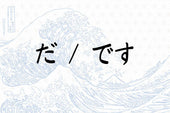
Understanding だ (da) and です (desu) in Japanese: Meaning and Usage
When learning Japanese, one of the first things you’ll come across is だ (da) and です (desu). These words don’t have a ...
-

Difference Between 及ぶ (およぶ) and 達成する (たっせいする)
Both 及ぶ and 達成する can relate to "reaching" or "achieving" something, but they have distinct nuances and usage contexts...
-

JLPT N5 Study Guide: A Beginner's Roadmap to Acing the Test
If you’ve just started learning Japanese and are aiming to ace the JLPT N5, yo...
-

Beginner's Guide to Japanese Particles: Learn the Basics
TL;DR: Japanese particles are crucial for structuring sentences, acting like conjunctions or prepositions in English...
-

JLPT N5 Vocabulary List - All 748 Words You Need to Know
Vocabulary is the foundation of any language, and Japanese is no exception. The more you know, the better. Over time ...
-
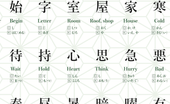
JLPT N4 Kanij List - All 176 Characters You Need To Know
After mastering the JLPT N5 kanji, you're ready to take your Japanese kanji game to the next level. JLPT N4. Let's go...
-
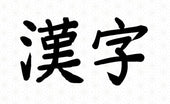
Kanji For Kanji - 漢字
Inception time. Which kanji compose the kanji of "kanji"? The kanji for "kanji" is actually pretty straightforward. I...
-

How to Memorize Katakana Easily: 9 Tips for Beginners
For those diving into Japanese, mastering hiragana and katakana is the first significant challenge. While hiragana o...
-
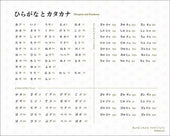
Complete Hiragana and Katakana Chart With All 112 Characters
The very first step for everybody who wants to learn Japanese is to study the hiragana and katakana chart (before lea...
-
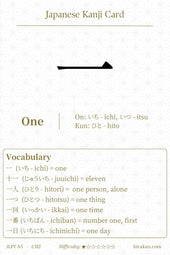
JLPT N5 Kanji: Kanji For One 一 (ichi)
Probably one the most simple kanji to remember, the kanji for 'one' is simply written '一'. Let's see its readings and...
-
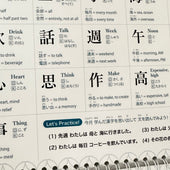
How Long Does It Take to Learn Kanji? A Beginner's Guide
Ask any Japanese student what's the scariest part of learning the language, and they'll say kanji. And they're righ...
-
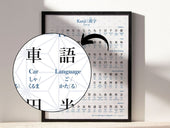
Is it Necessary to Learn Kanji? The Last Answer You'll Ever Need
Many beginners in Japanese wonder whether they should really learn kanji. I know this, because I also wondered when s...
-

How Long Does it Take to Learn Hiragana and Katakana?
As a beginner in Japanese, your first step is diving into the alphabets of Hiragana and Katakana. These are the build...
-

13 Best YouTube Channels to Learn Japanese, From Beginner to Intermediate
YouTube can be an incredible resource for learning Japanese. And best of all, it's free. So we've compiled a list of ...
-

Top 10 Manga for Japanese Language Learners: From Beginners to Intermediates!
If you're learning Japanese, chances are you're interested in manga. So instead of reading texts about Tanaka-san s...

![~に来る – Expressing ‘Come to Do (Something)’ in Japanese [JLPT N5]](http://hirakan.com/cdn/shop/articles/ni-kuru-come-to-co.jpg?v=1769937520&width=170)
![~に行く – Expressing ‘Go Somewhere to Do Something’ in Japanese [JLPT N5]](http://hirakan.com/cdn/shop/articles/ni-iku-go-somewhere-to-do-something.jpg?v=1769937474&width=170)
![~にあります/~にいます – Saying Where Things and People Are in Japanese [JLPT N5]](http://hirakan.com/cdn/shop/articles/ni-arimasu-imasu-location-of-existence.jpg?v=1769251504&width=170)
![~がある・~がいる – Talking About What Exists in Japanese [JLPT N5]](http://hirakan.com/cdn/shop/articles/ga-aru-iru-there-is-are.jpg?v=1769251452&width=170)
![~すぎる – Saying Something Is “Too Much” in Japanese [JLPT N5]](http://hirakan.com/cdn/shop/articles/sugiru-too-much.jpg?v=1769251408&width=170)
![~く/~になる/~くする – Expressing Change with Adjectives in Japanese [JLPT N5]](http://hirakan.com/cdn/shop/articles/ku-naru-suru-expressing-change.jpg?v=1769251371&width=170)
![な形容詞 (Na-adjectives) – Basic Forms with です in Japanese [JLPT N5]](http://hirakan.com/cdn/shop/articles/na-keiyoushi-basic-desu-forms.jpg?v=1769251316&width=170)
![イ形容詞 – Basic i-Adjective Conjugations in Japanese [JLPT N5]](http://hirakan.com/cdn/shop/articles/i-adjectives.jpg?v=1769251251&width=170)
![~ます – Polite Present and Past Verb Forms in Japanese [JLPT N5]](http://hirakan.com/cdn/shop/articles/masu_-_polite_verb_form.jpg?v=1767433709&width=170)
![よ – Adding Friendly Emphasis in Japanese [JLPT N5]](http://hirakan.com/cdn/shop/articles/yo_-_ending_particle_Friendly_Emphasis.jpg?v=1767433517&width=170)
![ね – Softly Seeking Agreement in Japanese [JLPT N5]](http://hirakan.com/cdn/shop/articles/ending_particle.jpg?v=1766907843&width=170)
![何・だれ・いつ・どこ・どう – Basic Question Words in Japanese [JLPT N5]](http://hirakan.com/cdn/shop/articles/Question_Words.jpg?v=1766907708&width=170)
![ここ・そこ・あそこ・どこ – Talking About Places in Japanese [JLPT N5]](http://hirakan.com/cdn/shop/articles/places_fb57172a-7d06-47ee-a9b7-c1f4b6b2b264.jpg?v=1766305419&width=170)
![この・その・あの・どの – Using ‘This / That / Which’ with Nouns in Japanese [JLPT N5]](http://hirakan.com/cdn/shop/articles/acd351ada3fe4b04ae86de788a3350b8.jpg?v=1766305268&width=170)
![これ・それ・あれ・どれ – Saying ‘This / That / Which One’ in Japanese [JLPT N5]](http://hirakan.com/cdn/shop/articles/this-that.jpg?v=1766305107&width=170)
![か~か – Expressing Choices like “A or B” in Japanese [JLPT N5]](http://hirakan.com/cdn/shop/articles/choices.jpg?v=1766304827&width=170)
![~から~まで – Saying “From A to B” in Japanese [JLPT N5]](http://hirakan.com/cdn/shop/articles/from-AtoB.jpg?v=1765093560&width=170)
![まで – Expressing “Until” and “Up To” in Japanese [JLPT N5]](http://hirakan.com/cdn/shop/articles/until-up-to.jpg?v=1765093405&width=170)
![から – Expressing “Because” and “From/Since” in Japanese [JLPT N5]](http://hirakan.com/cdn/shop/articles/because-from_since.jpg?v=1765093285&width=170)
![や – Listing Examples with “And, Among Others” in Japanese [JLPT N5]](http://hirakan.com/cdn/shop/articles/and.jpg?v=1765093138&width=170)
![か – Forming Questions and Saying “Or” in Japanese [JLPT N5]](http://hirakan.com/cdn/shop/articles/ka-questions.jpg?v=1763787134&width=170)
![も – Saying “Also” and “Too” in Japanese [JLPT N5]](http://hirakan.com/cdn/shop/articles/mo-also-too_99f908e6-78d0-4f82-8319-391ef42764bc.jpg?v=1763787251&width=170)
![と – Linking 'And', 'With', and Quotations in Japanese [JLPT N5]](http://hirakan.com/cdn/shop/articles/to-and-with-quotation.jpg?v=1763265110&width=170)
![で – Marking Where and How an Action Happens in Japanese [JLPT N5]](http://hirakan.com/cdn/shop/articles/de-where-how-action-happens.jpg?v=1763264973&width=170)
![へ – Marking Direction ‘Toward’ in Japanese [JLPT N5]](http://hirakan.com/cdn/shop/articles/he-marking-direction.jpg?v=1762667986&width=170)
![に – Marking Time, Destinations, and Recipients in Japanese [JLPT N5]](http://hirakan.com/cdn/shop/articles/ni-marking-destination.jpg?v=1762667846&width=170)
![の – Possession and Noun Linking in Japanese [JLPT N5]](http://hirakan.com/cdn/shop/articles/no-possession-and-noun-linking.jpg?v=1761961297&width=170)
![を – Marking the Direct Object in Japanese [JLPT N5]](http://hirakan.com/cdn/shop/articles/o-direct-object.jpg?v=1761960990&width=170)
![が – Marking the Subject ('Who/What') in Japanese [JLPT N5]](http://hirakan.com/cdn/shop/articles/ga-subject-marker_60f30f70-6ca5-47ee-9a00-3646195d7d3c.jpg?v=1761386355&width=170)
![は (wa) – Topic Marker and Contrast in Japanese [JLPT N5]](http://hirakan.com/cdn/shop/articles/wa-topic-marker.jpg?v=1761385996&width=170)
![じゃない・ではありません – Expressing 'Is/Was Not' in Japanese [JLPT N5]](http://hirakan.com/cdn/shop/articles/janai-dehaarimasen_2594963b-531e-4f4d-a9b0-361010e0a720.jpg?v=1760865884&width=170)
![だ・です/だった・でした – Saying ‘to be’ in Japanese [JLPT N5]](http://hirakan.com/cdn/shop/articles/da-desu-datta-deshita_58bbc732-53fd-48da-83c7-4e477e7cc0b2.jpg?v=1760864506&width=170)
















